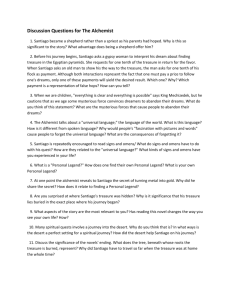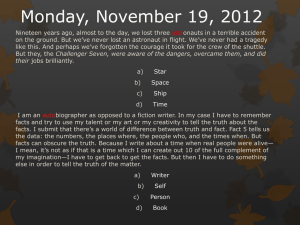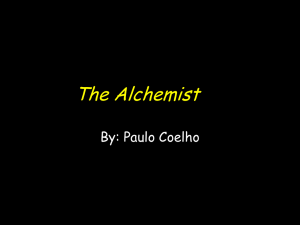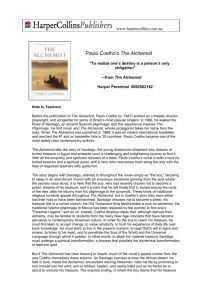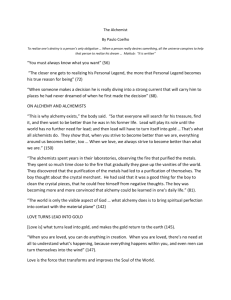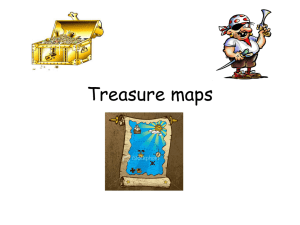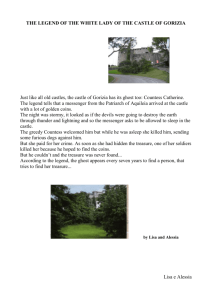The word 'alchemist' should be familiar to many having watched the
advertisement
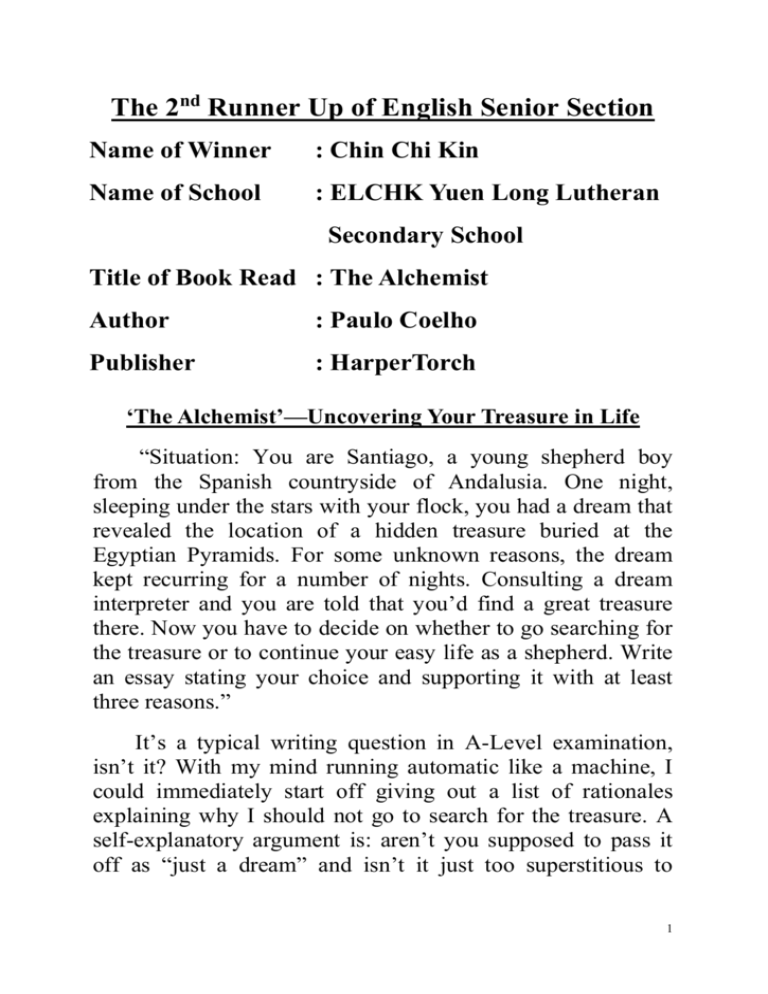
The 2nd Runner Up of English Senior Section Name of Winner : Chin Chi Kin Name of School : ELCHK Yuen Long Lutheran Secondary School Title of Book Read : The Alchemist Author : Paulo Coelho Publisher : HarperTorch ‘The Alchemist’—Uncovering Your Treasure in Life “Situation: You are Santiago, a young shepherd boy from the Spanish countryside of Andalusia. One night, sleeping under the stars with your flock, you had a dream that revealed the location of a hidden treasure buried at the Egyptian Pyramids. For some unknown reasons, the dream kept recurring for a number of nights. Consulting a dream interpreter and you are told that you’d find a great treasure there. Now you have to decide on whether to go searching for the treasure or to continue your easy life as a shepherd. Write an essay stating your choice and supporting it with at least three reasons.” It’s a typical writing question in A-Level examination, isn’t it? With my mind running automatic like a machine, I could immediately start off giving out a list of rationales explaining why I should not go to search for the treasure. A self-explanatory argument is: aren’t you supposed to pass it off as “just a dream” and isn’t it just too superstitious to 1 believe in the words of a dream interpreter? That’s not quite a dilemma at all. However, words are easy. Imagine that you are really put in the situation. Will you be lured by the hidden treasure? We may get stuck for words. Yes, I have to admit that I am too exam-orientated in answering the question. But sadly, in reality, many would make the same choice as me, wouldn’t they? What I mean is, how many people would try to live out their long-held dream in their childhood, when they set out into society? They would rather see it as a pipe dream only, feeling seemingly more satisfied with their status quo! I believe we need something to change our mindset. Through the exotic story of a young shepherd boy in Africa, the writer of the book ‘The Alchemist’, Paulo Coelho, provides readers with enlightenment and insight for the pursuit of their own treasure. The shepherd boy named Santiago is disturbed by a recurrent dream about finding a treasure in the Pyramids of Egypt. After seeking a gypsy, he is advised to look for the treasure. Later he meets an old man, a mysterious king, telling him that when people want something, all the universe conspires in helping them to achieve it. Being encouraged to find the treasure, Santiago leaves his sheep so as to embark on a long journey ridden with difficulties and unanticipated challenges to Africa, where he encounters several characters, notably the alchemist, from whom he gets much help along the way to realize his dream eventually. How many of you are once dissatisfied with the status quo, because of lacking genuine joy and peace in your daily 2 life, knowing undoubtedly that your life was meant for more than to study and work? ‘The Alchemist’ is not one of those books which ‘tells’ about value of life, but one which embodies it with the aid of the plot as a delicate wrapper. There is always a desperate need for us to be reminded of the value of life, simply because we learn so much every day that sometimes we seem to have forgotten what makes life worth living. Life gives us an opportunity to find our treasure, the special destiny known by our hearts, through following our Personal Legend (defined by the author as what we have always wanted to accomplish). Yet the strange fact Paulo Coelho points out is that few can resolve to attain their treasure, their destiny, as people don’t listen to their hearts and realize their Personal Legend. I find it extremely true. Everyone, when they are young, knows what their Personal Legend is. At that point of their lives, nothing is impossible and they are not afraid to dream in order to communicate with their hearts. But, as time passes, a mysterious growing force of negativity from difficulties and challenges begins to convince them that realizing their Personal Legend is impossible. It is at that point where people lose control of what’s happening to them and their lives become controlled by fate. Santiago’s journey in the book is a universal analogy to the journey of life itself. Many problems and troubles arise in Santiago’s journey, as in life, but I was finally in the realization that life after all is generous to those who pursue their destiny, when I witnessed Santiago’s success after suffering from the extremities of adversity and challenge. 3 Why does the story start off with the boy Santiago having a recurrent dream? It is because the author wants to tell us that everyone has a recurrent dream too, but in their hearts. Is that all about the story then? Absolutely not. Paulo Coelho also skillfully enveloped in the story a detailed solution to the prerequisites for realizing one’s Personal Legend. ‘Don’t give in to your fear.’ The alchemist said to Santiago. The ability to conquer the fear of failure is clearly indispensable to achieving a dream. Fear occurs owing to the presence of difficulties and challenges. It will only act as an invisible wall to prevent people from listening to their heart. Always are we told that we should not be afraid of failing because when there is a will, there is the very real possibility. However, I see it as a rather negative statement. It gives me a feeling that a greater possibility of failure exists. The author explains in a better way. He tells the reason for having so many obstacles on the way to one’s treasure, which is to make sure only those who have the responsibility for finding the treasure can find. That means we are already bound to achieve our own Personal Legend and those obstacles are only to test whether we are the right person. Aren’t we filled with more hopes in hearing this? It, in addition, doesn’t have any contradiction with the previous saying ‘when you want something, all the universe conspires in helping you to achieve it’. Difficulties actually help us to get closer to our treasure as experience accumulates to equip ourselves better for the challenges ahead on the way to realizing our Personal Legend. We should not live in either our past or our future. If we concentrate on the past, we will be too reluctant to risk losing 4 what we’ve already obtained in our lives. For instance, by the time the old man asked Santiago to give him one-tenth of his flock, Santiago instead suggested giving the old man one-tenth of his treasure for telling him how to find his hidden treasure. At that moment Santiago lived in the past. He was afraid of losing what he has so he started out by promising what he doesn’t even have yet. However, it is the losses during the pursuit of something that make us have a stronger desire to work towards it. Living in our future, which means to worry constantly about leading a life, is also not preferred. Santiago’s family works in a farm. One day, just after Santiago asked his father whether he can leave home to travel or not, he could see in his father’s gaze also a desire to be able to travel the world, despite the burial of it over dozens of years under the burden of struggling for water to drink and food to eat. If one lives in the future, he or she always feels restricted from doing what they like. The last requirement for realizing one’s Personal Legend, yet not easy to meet, is patience. When the boy asks why only few alchemists have succeeded in turning metal into gold, the alchemist explains that ‘They were looking only for gold… They were seeking the treasure, without wanting to live out the Personal Legend.’ People, sometimes, are so eager to find their treasure that they become impatient easily, but they will fail to see the signs and omens left by God along their path, as the writer mentioned, though without much elaboration. I would try to interpret it in this way. If we pushed forward impulsively, we may have skipped something we should learn. It will be, until 5 we find ourselves stuck by some difficulties for a long while, to realize that we have to learn something we miss again. We, ultimately, need a longer time to arrive at where the treasure is located. To prevent ourselves from getting impatient, a good way is to enjoy the process of pursuing our Personal Legend. We should remember that in spite of the treasure being not yet found, we already excel others who haven’t even discovered their Personal Legend, because we make our life meaningful, taking advantage of the opportunity life gives us to do what we want to accomplish. I recall a scene in the story that impressed me most. When the alchemist and Santiago are heading to the Pyramids of Egypt, they are one day approached by three armed tribesman who demand a body search of them. The tribesmen ask the alchemist what the flask of liquid and the yellow stone found on him are. The alchemist deliberately tells the truth that the flask of liquid is the Elixir of Life and the stone can turn any metal into gold, but the men just laugh at him and they don’t believe there are such great treasures in the world. The three tribal members are really silly, aren’t they? Then ask ourselves: do we resemble them in reality? In fact we may differ from them in nothing if we also don’t believe there is a great treasure awaiting us, as told by our heart. We don’t trust our heart while it tells the plain fact. Through reading the book ‘The Alchemist’, I had an important lesson about life. The book is not merely a piece of literary work. For anyone who has ever dreamed of finding your treasure in life, whether you are spiritually strong 6 enough to step out on faith or not, the book will come vividly as a tour guide to explain what confuses you on the way of your life journey. 7
